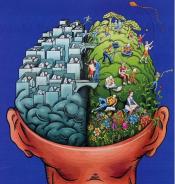Can CRISPR–Cas9 Boost Intelligence?
By Jim Kozubek,
Scientific American
| 09. 23. 2016
Not now, certainly, but maybe someday—although there are plenty of hurdles to overcome first
A letter was recently published in Nature on 329,000 young people identifying 74 genetic variants—spelling mistakes in single nucleotides in the six billion letter human genome—which can be used to predict nearly 20 percent of the variation in school years completed, a quantitative trait of fortitude which is correlated to general intelligence, and which you can learn about by sequencing your own genome.
Staple that to your college application.
Even before the “molecular age,” we were on guard for the slightest tips that show we are more or less valued than our peers. But there was also caution from the academics that there was actually very little we could do to leverage our biology for improvement. In 1924, the Harvard geneticist William Castle quipped that “we are scarcely as yet in a position to do more than make ourselves ridiculous in this matter. We are no more in a position to control eugenics than the tides of the ocean.”
Enter Crispr-Cas9, the first pair of tiny molecular...
Related Articles
By Julia Métraux, Mother Jones | 02.10.2026
Why was Jeffrey Epstein obsessed with genes? In the latest tranche of Epstein records and emails made available by the Department of Justice, themes of genes, genetics, and IQ—alongside more explicit threads of white supremacy—keep cropping up, often adjacent to Epstein’s...
By Teddy Rosenbluth, The New York Times | 02.09.2026
Dr. Mehmet Oz has urged Americans to get vaccinated against measles, one of the strongest endorsements of the vaccine yet from a top health official in the Trump administration, which has repeatedly undermined confidence in vaccine safety.
Dr. Oz, the...
By Ava Kofman, The New Yorker | 02.09.2026
1. The Surrogates
In the delicate jargon of the fertility industry, a woman who carries a child for someone else is said to be going on a “journey.” Kayla Elliott began hers in February, 2024, not long after she posted...
By Alex Polyakov, The Conversation | 02.09.2026
Prospective parents are being marketed genetic tests that claim to predict which IVF embryo will grow into the tallest, smartest or healthiest child.
But these tests cannot deliver what they promise. The benefits are likely minimal, while the risks to...




